Is there a new risk of transmission when a new coronary patient tests positive for the virus in his stool? How to protect against it?
Pneumonia with novel coronavirus infection is a completely new disease, and there are many unknowns about this disease that doctors and researchers are exploring. This includes testing for patients with novel coronavirus-infected pneumonia. A few days ago, it was reported that a positive result for nucleic acid was detected in the feces of patients with novel coronavirus infection, which can be considered a further step in the understanding of the disease.

Therefore, it is important to first correct the problem; it is the nucleic acid of the virus that tests positive, not the live virus.
Second, are there new risks of transmission and how can they be protected?
First, if a live virus is detected in a patient's feces, it basically means that the disease has the potential for fecal-oral transmission.
The so-called "fecal-oral" transmission does not mean that feces or fecal matter directly enters the mouth and causes transmission. The general way of fecal-oral transmission is that viruses and bacteria in feces first contaminate water sources, and then the contaminated water sources are used to irrigate vegetables, fruits, and other crops, or the contaminated water sources are used to breed aquatic products, and then people don't wash and cook the contaminated crops and aquatic products, which leads to the infection of bacteria and viruses. Especially in the south, many places are accustomed to wash the toilet in the rivers and reservoirs, and at the same time, there are also direct drinking water in the rivers and reservoirs, or the habit of using these water to water the fields and breeding, so it is more important to pay attention to.
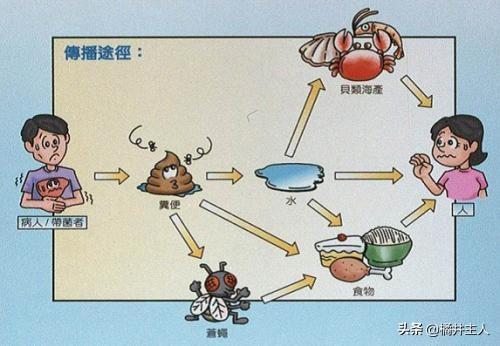
From this point of view, it is not the same as what is commonly thought of as fecal-oral transmission. It is not spread due to the splash of water when flushing the toilet, airflow from the return of the sewer, etc.
Second, given the fecal-oral route of transmission, its protection should look like this:
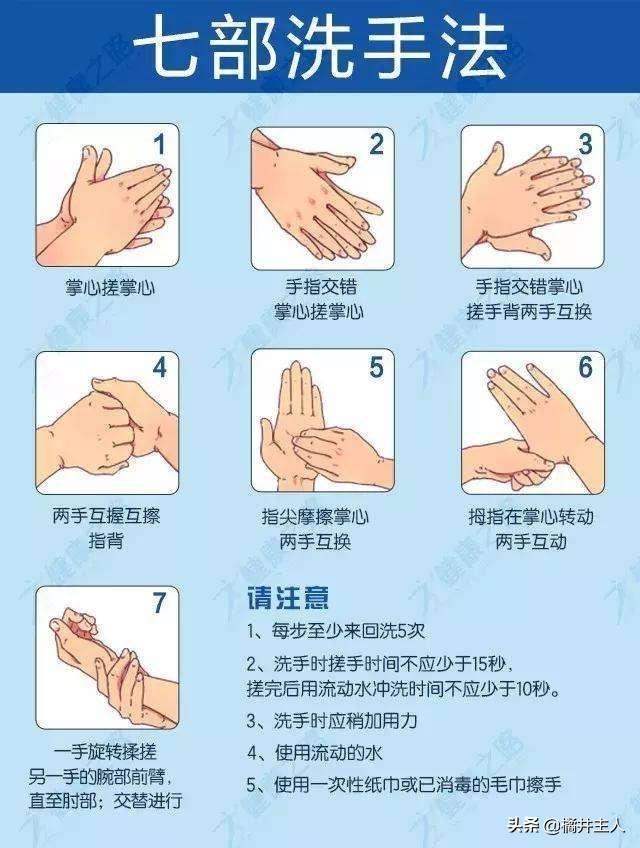
1. Always wash your hands thoroughly before and after meals. Follow the standard hand-washing procedure for palms, finger joints, back of hands, wrists, fingertips, and thumbs, and use soap and hand sanitizer to wash them. This is the most basic prevention method.
2. Do not use potentially contaminated river and pond water for watering fields and aquaculture.
3. Not to drink untreated surface water directly.
4. Add 84 disinfectant water or disinfectant tablets to disinfect the toilet after use and before cleaning.
5. Fruits, vegetables, aquatic products, etc. should be thoroughly cleaned, cooked and consumed, and raw and cooked should be strictly separated during processing. Wash fruits, vegetables, aquatic products in a timely manner after the use of soap, hand sanitizer and other hand washing.
Thanks for the invitation. This has been a topic of great concern in the past few days. On the evening of February 1, researchers from the Shenzhen Third People's Hospital found positive nucleic acid in the stools of a patient with C.pneumoniae. The National Health Commission also responded that "it has not yet been proved that the virus has a route other than respiratory and contact transmission". Why was the virus found in feces? What can ordinary people do to prevent the virus from spreading in their lives? This is what you should know if you are concerned about this issue.
Why was the "new coronavirus" found in the feces?
So far, there is no "official reason".
However, from a theoretical point of view, there is an explanation which we would like to make clear; the novel coronavirus itself is present in large quantities in the mucous membranes of the patient's nose, mouth and respiratory tract. Because of this, it is likely that the virus was "swallowed" into the digestive tract and eventually excreted in the feces.
"Nucleic acid test positive" this matter should be viewed objectively, "nucleic acid test positive" virus does not necessarily mean that it is a "live virus", for this matter we do not need to panic too much. There is no need to panic too much, all the research is in progress, we can pay more attention to the official information.
Of course, it's important to emphasize again and again that you should wash your hands reliably after you "poop" anyway to reduce the risk.
Is there a risk of "fecal infection"?
This risk does exist. Assuming that the "new coronavirus" in feces is a live virus, there is a risk of infection. For example, if a person infected with the virus or a carrier of the virus does not wash his/her hands after going to the toilet, it is easy for the feces and the virus to be spread to clothes and other objects through hand-to-hand contact, and then through respiratory contact after contact with other people, and the virus will be transmitted to them.
Of course, 'at risk' and 'inevitably contagious' are two different things in themselves, so there is no need to panic. At this point in time, transmission of the new coronavirus through the digestive tract has not been proven, not to mention that even if it exists, it is not a major channel of transmission, so there is no need to make a fuss.
Please take precautions when it comes to the matter of bowel movements:
It is important to wash your hands after a bowel movement, whether it is a bowel movement or a urination. "Hand washing" is an important precaution against viruses.
After defecation, please flush promptly to reduce the risk of transmission.
The "family bathroom" should be kept hygienic and clean, and extra attention should be paid to the "toilet", which should be disinfected regularly on a daily basis with '84 disinfectant + water' or medical alcohol.
Specifically, there are some little things to be strict about:
"Diligent disinfection" is the first thing; according to the instructions of "84 disinfectant" dilute disinfectant with water, disinfect and clean the toilet once a day; in addition, for the sink, door handle and other long-term contact with the parts should pay attention to the disinfection of sterilization.
Pay attention to "ventilation"; ventilate at least three times a day, opening the farthest facing window for half an hour each time; if natural ventilation is not available, use an "exhaust fan" to ventilate.
A "real-time report", there is no need to be overly "depressed". With scientific and reliable cleaning and disinfection, we could have eliminated the "new coronavirus" before infection. Hand washing is a priority, regular disinfection is a necessary measure, and good personal protection is a "basic virtue". We hope that you will be able to stay away from the NeoCornea Virus by taking proper precautions.

Note: Wang Silu original content, I hope to help you; images from the network, if any infringement, please contact to delete.
The epidemic of the new coronavirus is still ongoing, our research on the new virus is also continuing, with the research continues to deepen, the understanding of this new virus will become more and more clear, recently, domestic and foreign researchers in the study of the new coronavirus, have been detected in the new coronavirus infected patients with a positive viral nucleic acid, which means that, is not to indicate that this new virus not only can be transmitted not only through the respiratory tract, but also through the fecal-oral route? Let's take a look at the information we have received so far.
What is fecal-oral transmission?
There are two general misconceptions about fecal-oral transmission as a route of infection, and after we clear them up one by one, we'll have enough to understand the significance of fecal-oral transmission.
Some friends do not understand why fecal-oral transmission occurs, and we do not go to eat stool, so how can it be transmitted through fecal-oral transmission? In fact, pathogenic bacteria, viruses and other pathogens, if they can enter the intestinal tract, and eventually excreted through the feces, then in the process of our defecation, the process of wiping the buttocks, there is the possibility of contamination of the hands, these disease-causing microorganisms are and their small, invisible to the naked eye, but if this time, there is no good hygiene habits, after the stool did not wash their hands adequately, the pathogens may be through contact with the food, If you don't have good hygiene habits and don't wash your hands enough, these pathogens may contaminate other objects through contact with food, utensils, etc., and then be transmitted to others through direct or indirect pathways via food and drink, which is how fecal-oral transmission occurs. In addition, contamination of water by pathogens in feces and transmission by flies and other organisms are also common ways of fecal-oral transmission.
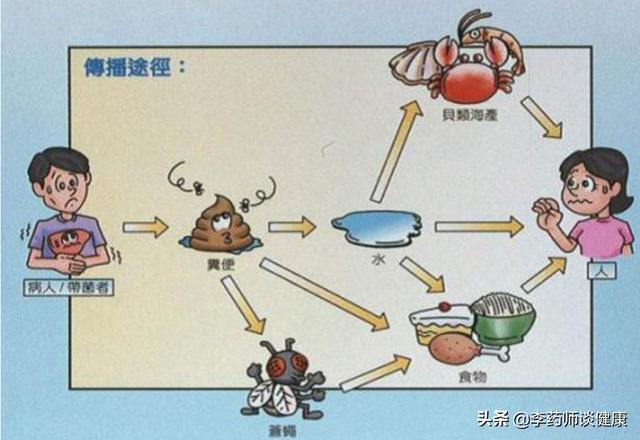
Regarding fecal-oral transmission, there is also a misunderstanding that as long as it is through the mouth, it is considered to be fecal-oral transmission. However, in fact, the general medical definition of fecal-oral transmission refers to infections caused by entering the digestive tract through the mouth to be considered to be fecal-oral transmission, for example, infections of respiratory epithelial cells due to the contact of the hands with pathogens that are caused by contact with the oral and nasal parts of the respiratory tract through the hands are not considered to be the fecal-oral route of transmission.
Does the detection of positive nucleic acid for a novel virus in feces mean that the virus can be transmitted by fecal-oral transmission?
There is no particularly definitive research on this claim.
In the relevant experts at the press conference, it seems that whether the new coronavirus can be infected through the fecal-oral route of cases, and in the new release of the new coronavirus infection of pneumonia diagnosis and treatment program for the trial of the fifth version of the new coronavirus infection, but also for the new coronavirus can be transmitted through the digestive tract of the possibility of the definition for the "not yet clear".

The reason why experts and treatment guidelines have come to such a conclusion is believed to be based on two main reasons: first, what has been found in feces is only viral nucleic acid, and no definitive viruses have been isolated; there is a difference between viral nucleic acid and active viruses; viral nucleic acid is the RNA structure of viruses, which is not necessarily contagious, whereas active viruses have a complete pathogen structure and are capable of transmitting infection; second, no definitive cases of disease acquired through fecal-oral transmission have been found; and second, no definitive cases of disease acquired through fecal-oral transmission have been found. Secondly, no clear cases of disease acquisition through the fecal-oral route have been found.
The short answer is:
1. Viral nucleic acids have been detected in feces, and the presence or absence of infectious active viral microorganisms has not been confirmed.
2. The virus triggers infection primarily by binding to respiratory epithelial cells, and there is no conclusive evidence as to whether it can infect people through the digestive tract.
But I believe that as we continue to study this new virus, these questions will be clarified and understood.
However, the results of this study also give us a warning that there is still a possibility that the virus can be transmitted through feces. In this case, if we want to do a good job of personal protection, it highlights the importance of "wash your hands", if we can do it!Wash your hands after going to the toilet, wash your hands before meals, wash your hands in time after going out and touching foreign objects, if you can't wash your hands in time, don't touch your mouth, nose and eyes with your hands, wash your hands in a reasonable way, wash your hands with flowing water, soap, or disinfectant hand sanitizer with alcohol, wash your hands thoroughly and adequately.This greatly reduces the likelihood that the virus will be transmitted by contact, fecal, or even fecal-oral transmission (which is not yet known, but is still a possibility).
Having said that, it is simple: whether it is fecal, contact or fecal-oral transmission, if you can do a good job of "washing your hands", why worry too much about the new risk of fecal transmission of viruses?
Many friends do not quite understand the fecal-oral transmission route. Even if there is a virus in the stool, how can the stool get into the mouth?
This is entirely possible. For example, if a patient with new coronavirus pneumonia accidentally gets stool on his hands (not necessarily visible to the naked eye) when he wipes his buttocks after having a bowel movement, and if he does not wash his hands in time and touches the food or utensils, the feces with the virus will get on them, and when other people go to eat the food, the virus will come in through the mouth.
Fecal-oral transmission can also be achieved if the person does not touch the food or utensils directly and touches other objects, such as tables, toys, etc., but another person touches these objects immediately afterward and then eats the food.
So you must wash your hands before and after meals, and you must clean and cook your food before eating it. If you are a patient or suspected carrier, you can avoid transmitting the virus to others; if you are a normal person, you can prevent others from transmitting the virus to themselves.
There is another possibility of fecal-oral transmission, such as in a public restroom, where the patient does not cover the toilet when flushing after using the toilet, the strong water pressure will cause the fecal aerosol to flush out, and the aerosol with the virus will be dispersed in the air, so that when the next person comes to use the restroom, the virus can be inhaled through the nose or mouth.
The best way to prevent this is to put the lid on the toilet before flushing.
Although fecal-oral transmission is not yet completely clear whether the new coronavirus will be transmitted, academician Zhong Nanshan reminded everyone that this transmission route must be emphasized, highly concerned, and do a good job of prevention.


Is there a new risk of transmission when a new coronary patient tests positive for the virus in his stool? How to protect against it?
The detection of viral nucleic acids in the feces of some patients suggests the presence of live viruses in the feces that may be capable of infection.
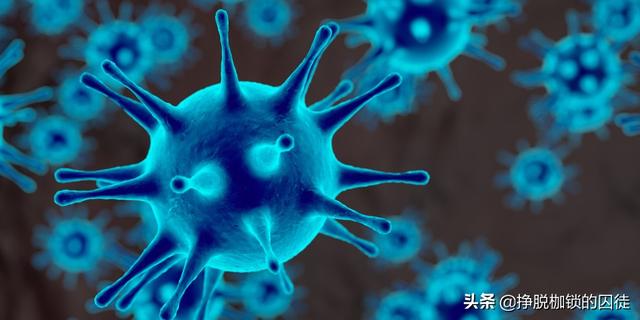 However, even if the presence of a live virus is eventually demonstrated by cell culture, it does not increase the risk of new transmission.
However, even if the presence of a live virus is eventually demonstrated by cell culture, it does not increase the risk of new transmission.
Because the presence of the virus in the feces adds only to the route of expulsion of the virus, there is no evidence or even indication that this virus can infect the body by other routes than the respiratory tract.
Fecal transmission ≠ fecal-oral route
It is common to see discussants involved in this issue make the conceptual error of equating the presence of viruses in feces with "
Fecal-oral route of transmission."
In fact, that's not what happened.
The so-called fecal-oral route of transmission is:
On the one hand, pathogens are excreted via the patient's feces, and through some medium of transmission, pathogens are ingested by other susceptible individuals;
On the other hand, the pathogen must also be swallowed into the digestive tract and cause an infection, known as a GI infection.
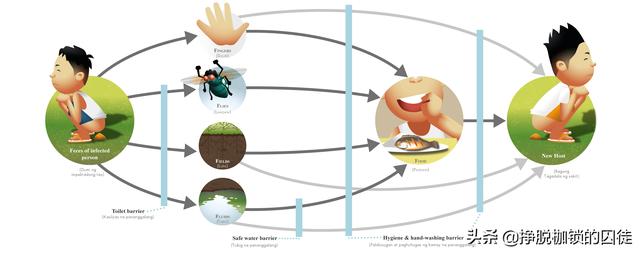
The most common forms of transmission via the fecal-oral route are diseases that manifest as diarrhea.
For example, diarrhea caused by norovirus, rotavirus, food poisoning caused by campylobacter, salmonella, shigella, and a number of other bacteria, theCholera caused by Vibrio cholerae, and some intestinal parasites, etc.
Of course, this also includes diseases that don't necessarily cause GI symptoms.
For example.Type A and EviralHepatitis, polio, etc.
If, although the pathogen passes through the feces, it does not pass through the GI tract to become infected, then it can only be described as being transmittable through fecal matter, rather than infection by the fecal-oral route.
For example, with SARS, the virus was also detected in the feces of many patients, yet no evidence of GI infection was found, and thus it was still considered a respiratory disease rather than a fecal-oral transmitted disease.
Viral infections need to be coded.
We know that viruses cannot replicate themselves like bacteria and must enter the host cell to utilize its organelles in order to multiply by chromosomal replication.
There is a 'gateway' to the door of entry of a biological cell, and only the spatial structure of the virus's proteins matches the structure of a specific receptor on the cell membrane in order to open a specific channel of entry on the cell membrane, in the same way that a key must be matched to a lock in order to open a gate.
Thus, the animals and cells that the virus can infect are specific.
For example, the original host of this new coronavirus may have been a bat, but the original bat coronavirus was not able to infect humans, and only became capable of infecting people after it was transmitted and mutated by another animal (yet to be found) that served as an intermediate host, resulting in its proteins mating with receptors on the membrane of a certain type of human cell.
It has been suggested that in this case, like the SARS virus, it is also the spiking protein (S-protein) on the surface of the virus that matches and binds to the angiotensinase 2 (ACE2) receptor on the membrane of human (lower) respiratory epithelial cells before entering and infecting the respiratory tract.
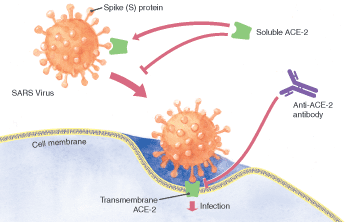
Although, ACE2 is present in many animal species, on cell membranes of different tissues, its exact structure is not exactly the same.
Thus, not all animals, or cells in existence can be infected by this new coronavirus.
At least, there is no evidence that this virus can infect cells in the human digestive tract.
That is, even if a virus passes through and is swallowed, it does not cause infection.
Therefore, even if live virus is detected in the patient's feces, it can only be said that feces is a route of virus expulsion, but the digestive tract is not the route of infection, and therefore, it still cannot be called fecal-oral transmission.
Increase the risk of new infections?
Strictly speaking, it won't.
From the above analysis, it can be seen that the current evidence still shows that Wuhan New Coronavirus infection is still a respiratory disease, and the infection is due to the fact that the virus can enter specific cells of the respiratory tract.
As for the route of entry of the virus into the respiratory tract, which has been described repeatedly earlier, it is nothing more than the fact that the virus excreted by the patient with respiratory secretions is mainly transmitted by respiratory droplets, and (direct or indirect) contact, and possibly airborne transmission.

Now that viral nucleic acids are detected in the feces of patients, even if live viruses are detected, this merely increases the source of viruses transmitted by indirect contact and does not fundamentally increase the risk of new transmission.
Therefore, there is no need to add new special protective measures.
Hi, first of all, I would like to correct the question, the test was positive for viral nucleic acid, which is a sequence fragment, not a virus. With what can be understood based on relevant interviews is that there is a risk of fecal-oral transmission, and efforts are being made to extract the virus, if it can be extracted, the risk of fecal-oral transmission is even greater, as explained to you below in several ways.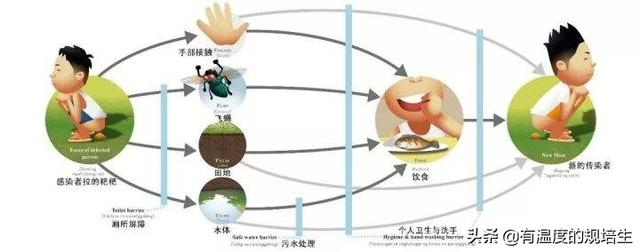
1. Clinical observation and further research are needed to confirm whether fecal-oral transmission is possible, so what is fecal-oral transmission?
Fecal-oral transmission can be guessed roughly based on two words, that is, the virus, bacteria with the bowel movement, I did not wash my hands, contaminated door knobs, keyboards, coffee tables and other external environments, and other people who have touched these contaminated public facilities, and did not wash their hands or wash them poorly, and then ingested the food directly and were infected.
2. How to protect?
Although fecal-oral transmission has not been confirmed, the presence of viral nucleic acid in the stool is something we need to take seriously. Although the presence of nucleic acid does not necessarily mean that there is a virus, and even if there is a virus, whether or not it can be transmitted through the fecal-oral route also needs to be further examined, as researchers and medical personnel are still gradually analyzing the characteristics of this disease in practice. We as the public, no medical knowledge background, as a qualified citizen, the important thing is to pay attention to the official channel news to understand the disease, do not believe rumors, do not spread rumors, and then is to actively cooperate with the government and medical personnel, we can not understand the nucleic acid of the virus and the difference between the virus, but it does not affect us to do a good job of protection, we need to be a good implementer of the village committee/community, We now need to be good executives, the village council/community, the official news tells you what to do and you do it, it is a good protection for yourself and your family. Then for this suspicious fecal-oral transmission route, there is no need for us to panic, do the following, the problem is not big.
(1),Wash your hands diligently, but also clean; before eating, after going to the toilet, after touching the items in the public area, use the surgical seven-part cleansing method is more effective (internal and external bow large standing wrist, random search can find related videos or pictures), each time to wash hands for not less than 20s.
(2),Keep stockpiles of food in an area of the house where no one passes back and forth to avoid constant contact with contaminated food. Wash and cook any food that comes into your mouth before eating it, so that even if there is a virus, it is washed away or extinguished by heat.
(3),Protect yourself from spreading the virus by covering your sneezes with toilet paper or bending your forearms to avoid touching them on objects around you.
(4),Wear disposable gloves on your hands when you have to go out shopping, or if you don't have them, bring your own clean grocery bags or other alternatives.
(5),Sanitize home utilities with disinfectants such as 75% alcohol, 84, and chlorine sanitizers.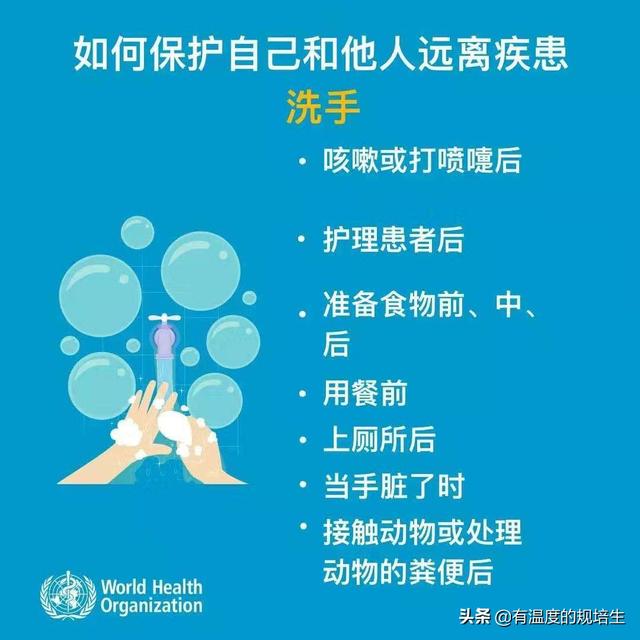
Summary: What has been detected in the feces so far are nucleic acid fragments of the virus, not the virus, and researchers are still working on further extractions. There is not yet sufficient evidence to prove that fecal-oral transmission is possible, but you can't take chances and take your chances, and you need to be protected.
The above is for reference only, the specific treatment plan is subject to the hospital! With the heart of the code word, seriously answer the question, feel okay, if you click a like or attention to it!
Virus fecal-oral transmission, in fact, is not the only new coronavirus will appear in the situation, even in the absence of new coronavirus, the intestinal tract is also a lot of bacteria, if the toilet is not seriously absorbed, usually also easy to cause a lot of food-borne illnesses, such as sudden diarrhea, abdominal pain, nausea, vomiting and so on the problem, all of which are related to the fecal-oral transmission, as long as before meals and after the toilet wash their hands carefully, you can be able to Prevent this transmission and also prevent the risk of many foodborne illnesses.
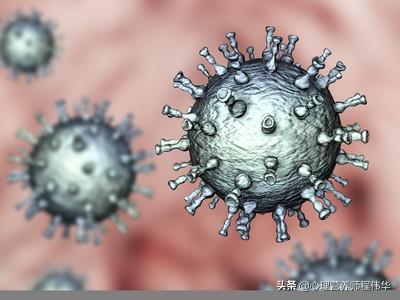
Many people may also worry that after the feces into the septic tank, it will be processed and discharged into the sea as well as will be used for fertilizer, which may cause infection, but these are not absolute, first of all, it is a matter of time, the virus will not exist indefinitely, and secondly, the virus is afraid of high temperatures, as long as the fish or vegetables are cooked and then eat it, there is no problem, not only do a good job of cleaning, but also pay attention to do not eat raw food, any raw food is best not to eat, even if the fruit if you do not need to peel the skin to eat it is recommended to use boiling water before eating! Raw food, any raw food is best not to eat, must be cooked before eating, even if the fruit, if you do not need to peel the skin to eat, it is recommended to use boiling water before eating.
However, the prevention of new crown, in addition to reducing the number of outings, do a good job of personal cleansing, more importantly, is their own immunity, because many people's health is now a sub-healthy condition, its own resistance is relatively poor, so it is more important to be in this period of time, exercise, to enhance the body's immunity, and a sufficient amount of drinking water 1500-1700 ml, as well as eating more fresh vegetables and fruits.
Clinical findings, some of the first symptoms of new coronavirus infection is only diarrhea, experts in the infected person stool and anal swabs have been found in viral nucleic acid, # confirmed patients feces detected in the virus RNA positive #. Experts warn that attention should be paid to the risk of transmission of novel coronaviruses in the digestive system, and that relevant protection should be taken.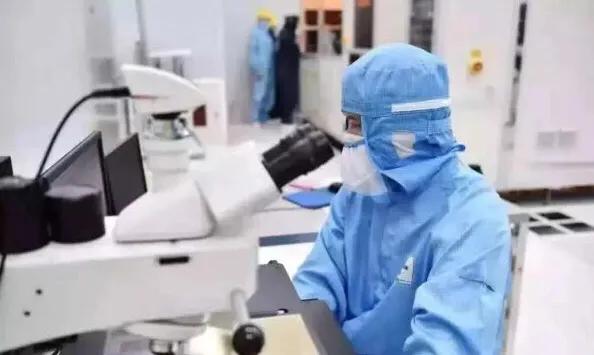
Recently, Wuhan University People's Hospital (WUPRH) and Wuhan Institute of Virus Research (WIVR) of Chinese Academy of Sciences (CAS) have been conducting an ongoing observational study based on a series of syndromes of the novel coronavirus. Associate Professor Zhang Qian of the Department of Respiratory Medicine and Associate Professor An Ping of the Department of Gastroenterology at the hospital observed that the first symptom of some patients with pneumonia infected by the novel coronavirus was only diarrhea, and it was suspected that the digestive system might also transmit the novel coronavirus. Later, the laboratory of researcher Shi Zhengli at the Wuhan Institute of Virology, Chinese Academy of Sciences, found viral nucleic acids in the stools and anal swabs of these patients.
Accordingly, the research team suggests that on the basis of the droplet and contact transmission proposed in the previous national authoritative guidelines, there is also a certain degree of fecal-oral transmission of the new coronavirus. Clinicians, especially gastroenterologists, should pay close attention to the atypical symptoms of pneumonia associated with novel coronavirus infections, and take personal precautions against patients' vomit and feces.
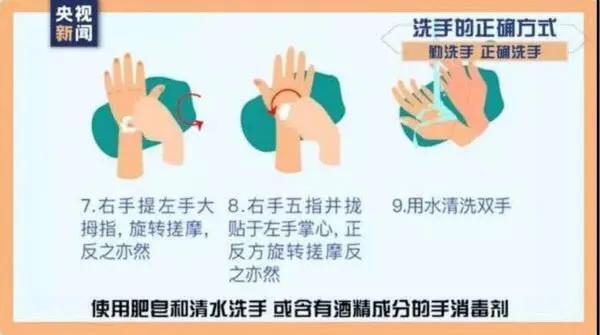
The research team reminds that when isolating patients at home with mild illness, extra attention should be paid to hand hygiene, while avoiding sharing the bathroom with family members as much as possible. If a separate bathroom is not available, home isolation can be properly disinfected after each use by means of lipid solvents such as ether, 75% ethanol, chlorine disinfectants, peracetic acid and chloroform.
The clinical department of Wuhan University People's Hospital has also found that some patients have chest images that are not consistent with their clinical symptoms. It is not necessary to review chest CT frequently to understand the progress of the disease, and it is sufficient to review chest CT with clinical symptoms in mind.
The clinical presentation of new crown pneumonia does present with gastrointestinal symptoms such as diarrhea and loss of appetite. For new patients, routine stool tests are routinely performed. If new gastrointestinal symptoms such as diarrhea occur during clinical treatment, the stool routine will be reviewed again, and stool culture will be considered on a case-by-case basis. Stool cultures may need to be repeated several times to confirm the diagnosis because of errors in sample collection.
The spread of all types of infectious diseases requires the formation of a transmission process through three key links: pathogens, transmission routes, and susceptible populations. The main means of transmission are airborne, contact, fecal-oral, insect-borne, and bloodborne. Airborne and contact transmission are easy to understand. Fecal-oral transmission is when viruses and bacteria are discharged from the digestive tract, contaminate the environment, hands and food, and then enter the digestive tract through the mouth to spread bacteria and viruses. Previously, fecal-oral transmission was mostly used for hepatitis A, typhoid fever, etc., as well as for parasitic diseases.

A positive test for the virus in the stool of a patient with neocoronavirus pneumonia first requires further testing to see if it is active in the stool and if it is neocoronavirus eggs, and if so, then it should be taken seriously, meaning that there is an additional route of transmission for neocoronavirus.
How long can a new coronavirus survive in vitro? Sars, also a member of the coronavirus family, is informative in this regard. sars viruses can survive on surfaces such as soil, glass, metal, and plastic for 2 to 3 days.
On a personal level, it is important to pay more attention to hygiene precautions. We the people can do our own personal protection and also dedicate ourselves to fighting the epidemic. Washing hands regularly, using alkaline soap, and various types of antiseptic hand sanitizers are also protective. 75% alcohol is the best disinfectant to break down the cell walls of bacteria and viruses. We hope that the people of today will make a concerted effort to do their part in personal protection.
This question and answer are from the site users, does not represent the position of the site, such as infringement, please contact the administrator to delete.